If your car engine is making a rattling noise, there is something wrong with your vehicle. An engine should always sound smooth.
If your engine starts making a rattling noise, here are 8 reasons why it is doing that:
Key Takeaway
- If your car engine is making a rattling noise you could have a faulty serpentine belt tensioner, a loose bolt on the mounting bracket, a loose timing belt, a rusty flex plate, a faulty harmonic balancer, a loose fan blade, an uncontrolled explosion in the cylinder or low levels of engine oil.
- If your car is making rattling noises, the first step is to identify the source of the noise and check for common issues like low engine oil or lack of oil circulation, then address the specific problem or seek professional help if needed.
- While it’s possible to drive with a rattling engine, it’s not recommended as the noise could indicate a serious issue, like low oil levels or engine damage, which could potentially lead to more costly repairs if not addressed immediately.
8 Reasons Why Your Car Engine Making a Rattling Noise
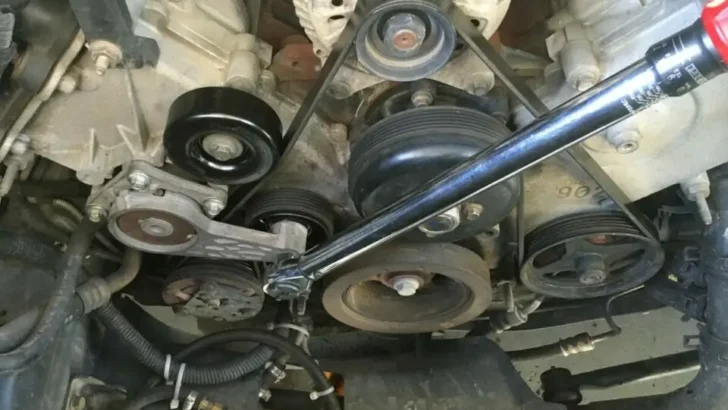
A car engine has to make some kind of noise. The engine has many moving parts which all make some kind of noise. But all of this is normal.
However, if your engine starts making a rattling noise, that is far from normal. Here are the top 8 reasons why your car engine is making a rattling noise:
1. Low Engine Oil
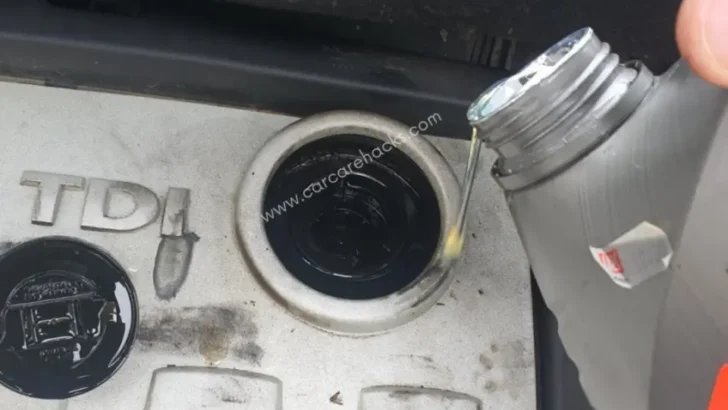
Engine oil is used to keep components lubricated and prevent damage due to friction, and as the level drops, more metal-to-metal contact can occur which causes vibrations that translate into the telltale rattling sound.
If your engine is making a rattling noise, the first thing to suspect is low engine oil. If your engine has low oil, it can cause rattling sounds due to poor or no lubrication for vinyl engine components.
Check engine oil level and add if needed. If the engine oil level is really low and the engine is rattling after the oil has been added, permanent damage could have occurred and replacement is needed for whichever part is been damaged.
2. Cracked or Broken Serpentine Belt
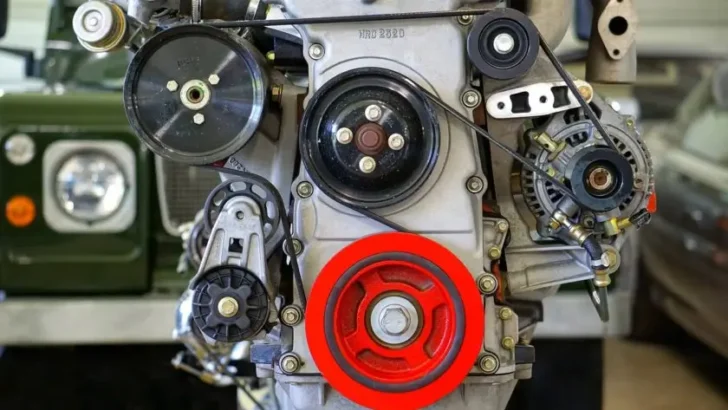
When the serpentine belt gets cracked or completely broken, it can make a rattling noise because it will get loose and hit vital engine components.
All diesel or gasoline cars have a serpentine belt. Some have one, some have two or three. The serpentine belt has a function to drive your alternator, water pump, and air conditioner compressor. Very often the serpentine belt is mistaken for a timing belt.
The difference is that the timing belt runs the engine camshaft and in most cases, you cannot see it because it is hidden under protective covers, whereas the serpentine belt is visible.
If the serpentine belt breaks, your engine would start making a rattling noise. The car won’t be drive-able and you would have to call a towing truck. If you drive your car with a broken serpentine belt, the engine would overheat because the water pump won’t work.
3. Broken Mounting Bracket
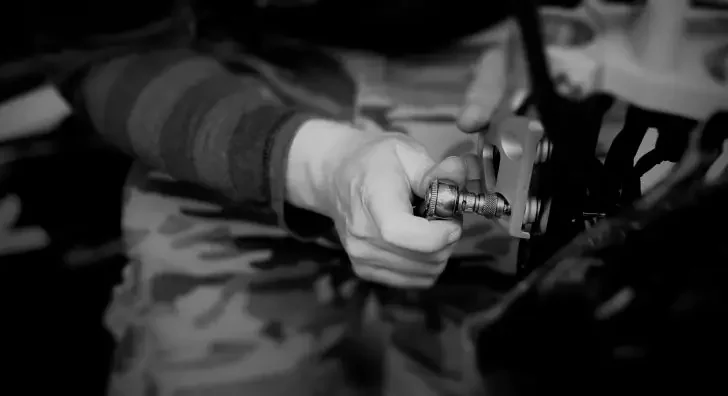
A broken or worn mounting bracket will allow the engine to move freely, creating vibration and rattling noise while running.
The third thing that could be making a rattling noise is a broken mounting bracket. Mounting brackets are used to support various accessories such as the power steering pump compressor and air pump, as well as to attach the engine to the vehicle frame.
If one of these mounting brackets is broken, the component that the bracket is holding will start to vibrate and make a rattling noise. You would need to check every mounting bracket nut or bolt to make sure that there is nothing loose says RepairPal.
4. Broken or Cracked Timing Belt
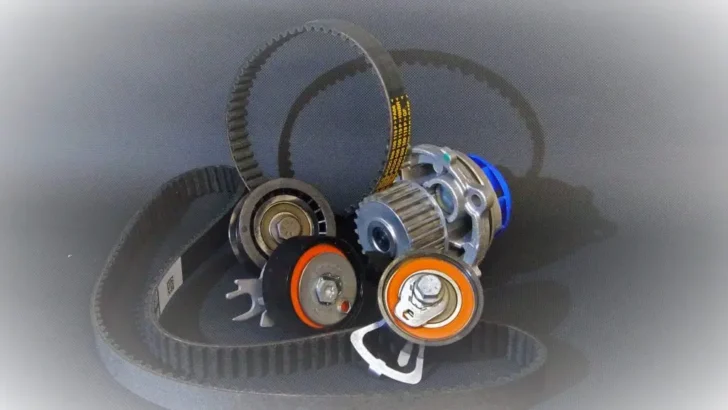
A broken timing belt may cause the engine to make a rattling noise because the timing belt synchronizes the camshaft and crankshaft of an engine, allowing them to communicate with one another seamlessly.
The timing belt has a function to connect the engine crankshaft to the camshaft which allows the valves to open and close at the correct timing with the position of the pistons. The timing belt has to be under certain tension which is allowed by a timing belt tensioner.
When the timing belt is broken, however, this communication is hindered or disrupted, causing mechanical components to work against each other rather than with each other which produces a rattling sound in the process.
If the timing belt or the timing belt tensioner gets damaged, it will get loose and will start to vibrate and make a rattling noise. You must always change your timing belt if you notice any cracks to avoid any additional damage to the engine.
5. Broken Flexplate
A flexplate is an integral part of any car with an automatic transmission and serves as a connection between the engine and the transmission. Its purpose is to absorb vibrations, but if it weakens or cracks over time, it can start making rattling noises.
The flexplate or a flex-shock device is found in cars with automatic transmissions and has a function to connect the crankshaft to the torque converter and improve smooth running.
If your vehicle has a broken flexplate, the connection between the crankshaft and the torque converter would be compromised and it won’t run smoothly.
The flexplate will start to wobble and will most definitely produce rattling noise. If this is the case, you would have to remove the flexplate cover. Then, check for rust, cracks, or missing bolts.
6. Broken Crankshaft Harmonic Balancer

Rattling noises are often caused by a broken crankshaft harmonic balancer. It is located between the crankshaft of the engine and a pulley, usually at the front of the engine. The main purpose of this part is to reduce vibration and noise levels.
So, if it breaks or becomes worn down over time then it will no longer be able to do its job properly and rattling noises will start emerging from inside the engine compartment.
The crankshaft harmonic balancer is part of the crankshaft. It has the function to absorb and reduce vibrations from the engine as the crankshaft rotates. It is made of rubber and metal and can be found at the front of the crankshaft pulley.
If the rubber and metal on the crankshaft harmonic balancer wear or get dislodged it would make a rattling noise and cause engine vibrations. It is an expendable item and at some point in time, it would fail.
7. Faulty Fan Clutch

The fan clutch is a component of the cooling system that regulates the engine temperature by engaging and disengaging the engine cooling fans.
Some vehicles have mechanic fans, and some had electric fans, but they both operate based on engine temperature. Once the engine temperature gets high, the thermostat triggers the fan clutch which engages the cooling fans.
If the fan clutch is faulty and gets stuck in an engaged position, it will turn on the engine fans even when they are not needed which will create a loud noise.
If the cooling fans run for a longer period of time, they can get loose and start creating a rattling noise. Open up the hood and inspect the fan blades by checking for excessive movements.
8. Engine Knock or ”Pinging”
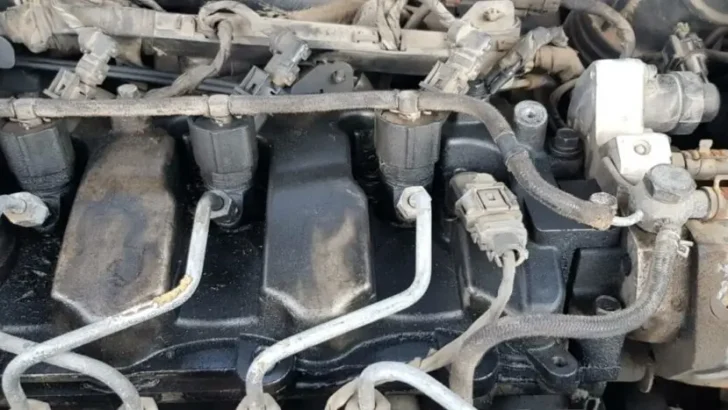
An engine knock or pinging occurs when the mixture of air and fuel inside a cylinder is incorrect or unbalanced which makes the fuel burn unevenly causing shock waves at the wrong times which is making a rattling noise and can damage the cylinder wall or the pistons.
Basically, when an uncontrolled explosion happens in the cylinder it can sound like an audible rattle. Most cars have knock sensors that control this condition. But, if the fuel octane levels are too low it will persist anyways. If the problem keeps happening, the engine could have carbon buildup.
What To Do About Rattling Noises In a Car
- Identify the source of the noise: Try to pinpoint where the rattling is coming from. Is it under the hood, in the trunk, or inside the car? Knowing the location can help narrow down the possible causes.
- Check for loose parts: Look for any loose parts in the area where you hear the rattling. This could include everything from screws and bolts to larger components. If you find anything loose, tighten it up and see if the noise stops.
- Inspect the exhaust system: A common cause of rattling noises is a loose or damaged exhaust system. Check your exhaust pipes, muffler, and catalytic converter for any signs of damage or loose connections.
- Check the engine: If the noise is coming from under the hood, it could be a problem with the engine. Check for any obvious signs of damage or wear, but keep in mind that diagnosing engine problems often requires professional expertise.
- Look at the tires and suspension: Sometimes, rattling noises can be caused by issues with the tires or suspension. Check your tires for any signs of damage, and look at the suspension components for any signs of wear or loose connections.
- Consult a professional: If you can’t identify the source of the noise or fix it yourself, it’s time to consult a professional. Take your car to a trusted mechanic who can diagnose and fix the problem.
Is Engine Rattling Serious?
Yes, engine rattling is indeed serious. It often signifies underlying mechanical issues that need immediate attention. If left unattended, these problems can escalate, leading to costly repairs or even engine failure.
The source of the rattling can vary. It might be due to a loose or weak timing belt, a chain tensioner issue, a cracked flywheel, or even a failing catalytic converter. Each of these issues can have significant impacts on your vehicle’s performance and longevity.
Can I Drive With a Rattling Engine?
While it’s technically possible to drive a car with a rattling engine, it’s not advisable. The rattling noise is a warning signal that something is wrong with your vehicle’s engine.
It could be a minor issue like a loose screw or bolt, or it could be something more serious like a failing timing belt or a problem with the catalytic converter.
Continuing to drive with a rattling engine could potentially lead to more severe damage, resulting in much costlier repairs down the line. It may even lead to complete engine failure, which can be dangerous if it happens while driving.
Is It Normal For a Car To Make a Rattling Noise?
No, it’s not normal for a car to make a rattling noise. Cars are designed to run smoothly and quietly, so any unusual noise is typically indicative of an underlying problem.
A rattling noise could be caused by a variety of issues, such as loose parts, problems with the exhaust system, engine troubles, or issues with the tires or suspension.
While some causes may be minor and require simple fixes, others could signal more serious problems.
Therefore, any persistent or unusual noise from your car should be checked out by a professional mechanic to ensure the vehicle is safe and functioning properly.
FAQs
Q: How do I know if the rattling noise coming from my car engine is serious?
A: If the rattling noise is accompanied by other symptoms such as loss of power, poor fuel economy, or rough idling, it could indicate a more serious issue with your car engine. Additionally, if the rattling noise is constant and gets louder over time, it is advisable to have it checked by a mechanic as soon as possible.
Q: Can I still drive my car if the engine is making a rattling noise?
A: It is generally not recommended to drive your car if the engine is making a rattling noise. Continuing to drive with a rattling engine can worsen the problem and potentially cause further damage to your car. It is best to have it inspected and repaired by a professional mechanic before driving it again.
Q: How much does it cost to fix a rattling engine?
A: The cost of fixing a rattling engine can vary depending on the specific issue causing the noise and the make and model of your vehicle. Repair costs can range from a few hundred dollars for minor repairs to several thousand dollars for more extensive engine repairs. It is best to get a quote from a professional mechanic to determine the exact cost for your particular situation.
Q: Can I fix a rattling engine myself?
A: Unless you have experience and knowledge in car engine repairs, it is not recommended to try and fix a rattling engine yourself. Car engines are complex systems, and trying to repair them without the proper expertise can lead to further damage or even injury. It is best to leave engine repairs to trained professionals.
Q: How long does it take to fix a rattling engine?
A: The time it takes to fix a rattling engine can vary depending on the specific issue causing the noise and the availability of parts. Minor repairs can often be completed within a few hours, while more extensive repairs may take several days. It is advisable to consult with a professional mechanic who can provide a more accurate estimate based on your specific situation.
Q: What steps can I take to prevent my car engine from making a rattling noise?
A: Regular maintenance and care of your car engine can help prevent it from making a rattling noise. This includes changing the engine oil and filter as recommended by the manufacturer, keeping the engine properly lubricated, and ensuring that all engine components are tightened and secure. Additionally, paying attention to any unusual noises or symptoms and addressing them promptly can help prevent more serious engine issues.
Q: Is a rattling noise always a sign of a major problem with the car engine?
A: Not necessarily. While a rattling noise can indicate a problem with your car engine, it does not always mean that the issue is major. Sometimes, the noise can be caused by a minor problem such as a loose belt or a worn-out pulley, which can be relatively inexpensive to fix. However, it is always advisable to have a professional mechanic inspect and diagnose the issue to determine the severity of the problem.
Q: Can a rattling engine cause damage to other parts of the car?
A: Yes, a rattling engine can cause damage to other parts of the car if left unaddressed. The vibrations and movements caused by a rattling engine can lead to loose or damaged components in the surrounding areas, such as the exhaust system or the cooling system. It is important to have a rattling engine inspected and repaired promptly to prevent further damage to your car.
Q: What should I do if my car engine starts to rattle?
A: If your car engine starts to rattle, the best course of action is to have it inspected by a professional mechanic. They will be able to diagnose the issue and recommend the appropriate repairs. It is important not to ignore a rattling engine as it can worsen and potentially cause further damage to your car if left untreated.
In Conclusion
In conclusion, a rattling noise from a car engine can be attributed to various causes such as a loose or weak timing belt, chain tensioner, cracked flywheel, or a failing catalytic converter.
These noises are not just disturbing but could signify serious mechanical issues that need immediate attention.
It’s crucial to get the car inspected by a professional mechanic as soon as these sounds are noticed to prevent further damage and ensure the vehicle’s optimal performance.
